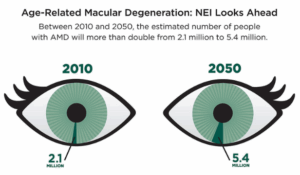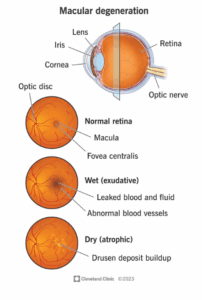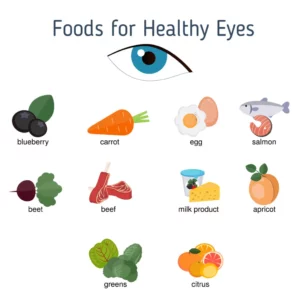It’s easy to overlook your eyes… until your vision starts to slip. For many men, that shift happens earlier than they expect. Blurriness. Difficulty seeing in low light. A growing dependence on reading glasses. One potential culprit? Macular degeneration.
Often thought of as an older person’s issue, macular degeneration is showing up in younger men, particularly those under high oxidative stress, working long hours on screens, or missing out on key nutrients. And while some causes are genetic, prevention is far more within reach than most guys realize.

Let’s break down what macular degeneration is, why men are at risk, and how to protect your vision for the long haul.
What Is Macular Degeneration?
Age-related macular degeneration (AMD) is a chronic condition where the macula – the central part of the retina—deteriorates over time. This leads to a loss of sharp, central vision. There are two types:
the central part of the retina—deteriorates over time. This leads to a loss of sharp, central vision. There are two types:
- Dry AMD: Gradual breakdown of macular tissue. Slower, more common.
- Wet AMD: Abnormal blood vessels grow under the retina and leak fluid. Faster, more severe.
Symptoms include:
- Blurry or distorted vision
- Difficulty seeing fine detail
- Trouble with night driving or reading
- A dark or empty spot in the center of vision
AMD doesn’t cause total blindness, but it robs you of your central vision – the part that lets you recognize faces, read, and live independently.
Why Men Are at Risk
Statistically, AMD affects both genders, but certain lifestyle factors common among men may accelerate onset:
among men may accelerate onset:
- High screen time (blue light exposure)
- Low antioxidant intake (especially zinc, lutein, and vitamin C)
- Smoking (doubles your risk)
- Poor circulation (linked to heart health)
- Lack of regular eye exams
Men often avoid medical checkups until symptoms are obvious, and by then, AMD may already be in progress.
Screen Time, Blue Light, and Oxidative Stress
One of the emerging concerns in men’s eye health is chronic exposure to blue light – emitted from phones, tablets, computers, and LED lights. Blue light penetrates deeply into the eye and increases oxidative stress in retinal cells.
Over time, that stress contributes to the kind of inflammation and tissue breakdown seen in macular degeneration.
Add in lack of sleep, high stress, and processed food consumption, and you’ve got a recipe for early retinal aging – even in your 30s or 40s.
Nutrients That Protect Your Eyes
Research shows that specific nutrients play a powerful role in slowing or preventing macular degeneration:
- Lutein + Zeaxanthin: Found in leafy greens, egg yolks, and brightly colored
 veggies. These carotenoids concentrate in the retina and filter harmful blue light.
veggies. These carotenoids concentrate in the retina and filter harmful blue light. - Zinc: Helps deliver vitamin A to the retina and maintain healthy cell structure.
- Vitamin C + E: Antioxidants that reduce oxidative stress in the eyes.
- Omega-3s: Particularly DHA, which supports retinal membrane integrity.
- Astaxanthin: A marine-based antioxidant that may reduce eye fatigue and protect the retina.
Whole Foods First
While supplements can help, food synergy matters. Nutrients like lutein and DHA are better absorbed when consumed as part of a whole meal, especially with healthy fats. For example, pairing sautéed kale with pastured eggs or wild-caught salmon boosts carotenoid absorption. Similarly, adding turmeric to olive oil-based dressings can support overall eye and brain health.
A nutrient-dense plate isn’t just good for your waistline – it’s fuel for your eyes.
Pro Tip
Look for supplements labeled “AREDS2 formula” – based on a major NIH study showing slowed AMD progression with this combination.
showing slowed AMD progression with this combination.
Healthy Habits for Eye Longevity
Preventing AMD isn’t just about popping vitamins. Your daily habits make a huge impact.
Your Daily Vision Checklist
- Morning sun exposure (10–20 mins)
- Blink breaks every 20 minutes of screen use
- Limit screen time before bed
- Keep screen brightness in balance with ambient light
- Wear blue light-blocking glasses when on screens
- Eat a rainbow of fruits and vegetables, especially dark leafy greens
- Quit smoking if you haven’t already
- Exercise regularly to boost circulation
- Get annual eye exams, especially if you’re 40+
- Hydrate – dehydration can impact eye pressure and fatigue
These micro-habits add up – your future self will thank you.
Don’t Ignore the Bigger Picture
Macular degeneration is part of a larger pattern of modern chronic disease: too much light, too little rest, poor circulation, and nutrient deficiency. The eye is a window into your overall health, not just a tool for vision. Blurry sight might be the first signal your body sends about deeper oxidative damage or inflammation happening systemically.
light, too little rest, poor circulation, and nutrient deficiency. The eye is a window into your overall health, not just a tool for vision. Blurry sight might be the first signal your body sends about deeper oxidative damage or inflammation happening systemically.
That’s why vision care shouldn’t be siloed off as something separate from your daily wellness. If you’re focused on optimizing your brain, your performance, or your aging process, supporting your eyes isn’t optional – it’s foundational.
Long-Term Vision Starts Now
Men often underestimate how quickly vision changes can sneak up. By the time you notice serious issues, retinal damage may already be underway. Prevention isn’t just about supplements – it’s about designing a lifestyle that supports your biology.
Prioritize recovery. Eat real food. Protect your eyes from modern stressors. And most of all, treat your vision like you would your muscles or your brain, with respect, strategy, and consistency.
Bottom Line: Don’t Wait for Vision Loss
Macular degeneration isn’t inevitable, but it is insidious. By the time most men notice the symptoms, the damage is done.
The good news? There’s so much you can do – starting now. Support your eyes with nutrition, limit harmful exposure, and treat your screen habits like your joints or your heart: with respect.
Because your eyes don’t just help you see, they help you show up in the world with confidence, clarity, and independence. Protect them like your life depends on it. Because in a way, it does.


 veggies. These carotenoids concentrate in the retina and filter harmful blue light.
veggies. These carotenoids concentrate in the retina and filter harmful blue light.





